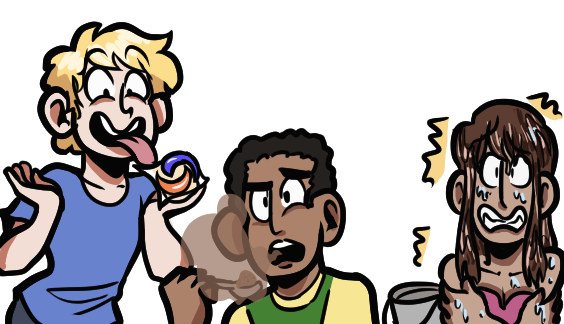The digital threat
February 23, 2018
Laying on top of a car on a blow-up raft, speeding on a sled being pulled by a truck, riding a bike from a steep hill into a stop sign and snorting coffee beans. To be funny, junior Michael Fiddler’s adrenaline junkie qualities have made him do these activities and many more. The snorting of the coffee beans, something he hadn’t planned on doing, happened on a baseball trip for the school. Why? Because the players had some down time and wanted to make themselves laugh.
“Joey Lemons, he graduated last year, he got coffee beans and he was like ‘I’m going to do this and I was like, ‘no you’re not’… he backed out so I was like, alright I’m gonna show him up and be the funny guy,” Fiddler said.
Even though Fidler isn’t attempting mainstream media trends like eating tide pods for the “Tide Pod Challenge” because he considers those type of challenges “stupid.” Why teens like Fidler try to thrust themselves into danger can be rooted into the psychology behind the production of the media and the videos that come from it. The “Hot Pepper Challenge” is among the more dangerous ones, since the participants eat the dried Carolina Reaper, one of the world’s hottest peppers, but three students from SHS were recruited willingly to try the challenge.
The Carolina Reaper is the hottest pepper to date, officially, with only one other pepper supposedly above it in hotness. The pepper is set at 2.2 million on the Scoville heat scale according to Pepper Head, where all of the world’s hottest peppers are ranked.
Senior Brenden Coomler says it was his fourth time consuming the pepper, and his tolerance on a scale of 1-10 is about a 9, meaning he has a high tolerance at handling hot spices. Taking a bite into the pepper, Coomler set the pepper down and chewed. After a moment, The Journal staffers started to ask him questions, and his voice was strained because, according to him, his throat was very tight, due to the spice.
“It’s not as bad as when you eat a fresh one,” Coomler said. “Why is my throat like that?”
Junior Savannah Straub is opposite of Coomler, with a low tolerance to spicy foods, as she considers barbecue sauce spicy. Deciding to only take a small bite at first, she said she couldn’t feel the burning sensation at first, prompting herself to take a bigger bite out of the extremely hot pepper.
She then said every time she breathed, the feeling got worse. She was trying to get things out of her braces with her tongue that didn’t feel like anything was there. In the end she described the pepper, “worse than Smart Mouth pizza” meaning that the pizza was spicy to her, but the pepper was worse.
“My tongue doesn’t feel like a tongue anymore,” Straub said.
Junior Keily Conchas ate the pepper alongside Straub, and The Journal was later informed that she was puking shortly after. This was due to either being lactose intolerant and taking the milk we provided in case they needed it, or the pepper itself since she was the one who ate the most: an entire pepper in the one sitting.
The volunteers were able to walk away, but it has been recorded that the Carolina Reaper has been known to “occasionally lead to health problems like shortness of breath, vomiting, seizures and, in a few extreme cases in children, death,” according to the Huffington Post.
Another popular challenge, the “Cinnamon Challenge,” where “the ingestion of the powder invariably stimulates the gag reflex followed by inhalation of the powder that’s stuck inside the mouth and throat. The pain then causes rapid exhalation characterized by ‘dragon breath’ upon blowing the powder out,” according to Forbes. The teens who attempt these type of challenges are messing with dangerous things, risking their health to attempt these challenges.
Looking into the psychology behind the decisions that teens have made to attempt the challenges, Psychology Today’s Katherine Ramsland, PhD, wrote, “they look for novelty and are easily influenced by the latest trends and by their need to belong to the in-group. They use these dares to prove themselves and build their self-esteem. They often cannot correctly evaluate the consequences, for themselves or others. Although they’re still held responsible if they harm others in the process, they don’t think about such consequences.”
The kids can get extremely hurt, all for attention from other people. Fiddler doesn’t normally attempt ones that are dangerous to his health but ones that seem funny to him. Straub says the people who do these do them for attention and it’s stupid to her as well.
“I think a lot of them are really dumb, honestly,” Straub said. “I think it’s pretty pointless, and it might be like a test of strength to some people, but if I do things like this it’s because I think it’s funny.”



